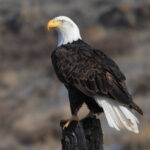Bald eagles are known to be opportunistic feeders, and they will often scavenge on dead animals, also known as carrion. This behavior is particularly common in young eagles who are still learning to hunt effectively. In fact, during their first year, bald eagles will rely heavily on scavenging to meet their dietary needs.
Bald Eagles and Scavenging
Bald eagles are known to feed on a variety of dead animals, including:
- Fish
- Waterfowl
- Small mammals like groundhogs
- Larger animals like deer
This scavenging behavior is driven by the fact that bald eagles are opportunistic feeders, meaning they will take advantage of whatever food source is most readily available and requires the least amount of energy to acquire.
Importance of Scavenging for Young Bald Eagles
 Image source: Bald Eagle (Haliaeetus leucocephalus) in Kachemak Bay, Alaska
Image source: Bald Eagle (Haliaeetus leucocephalus) in Kachemak Bay, Alaska
During their first year, bald eagles are still developing their hunting skills and may struggle to catch live prey. Scavenging on dead animals allows them to meet their dietary needs while they hone their hunting abilities. This is particularly important during the winter months when food can be scarce.
Bald Eagles’ Digestive System and Scavenging
Bald eagles have a highly specialized digestive system that allows them to effectively process and digest the bones, fur, and feathers of their prey. They have strong stomach acids that can break down these materials, and they will often expel any undigested materials in the form of pellets.
Risks of Scavenging for Bald Eagles
While scavenging is a common behavior for bald eagles, it does come with some risks. One of the primary concerns is the potential for lead poisoning. If a deer or other animal has been shot with a lead bullet, the lead can accumulate in the animal’s tissues and be ingested by the bald eagle when it scavenges on the carcass. This can lead to serious health issues and even death for the eagle.
Conclusion
In summary, bald eagles are known to be opportunistic feeders and will often scavenge on dead animals, particularly during their first year when they are still developing their hunting skills. This scavenging behavior is an important part of their diet and helps them meet their nutritional needs. However, it is important to be aware of the potential risks, such as lead poisoning, that can come with this behavior.
References:
– Journey North Bald Eagles. (n.d.). Food. Retrieved from https://journeynorth.org/tm/eagle/Food.html
– American Eagle Foundation. (n.d.). Bald Eagle Diet. Retrieved from https://eagles.org/what-we-do/educate/learn-about-eagles/bald-eagle-diet/
– Loudoun Wildlife Conservancy. (2023, April 03). Bald Eagle Diet and Digestive System. Retrieved from https://loudounwildlife.org/2023/04/bald-eagle-digestive-system/
– Reddit. (2022, March 23). Is it true that Bald Eagles are primarily scavengers and very rarely hunt their prey? Retrieved from https://www.reddit.com/r/NoStupidQuestions/comments/tlktf2/is_it_true_that_bald_eagles_are_primarily/
– Oceana. (n.d.). Bald Eagle. Retrieved from https://oceana.org/marine-life/bald-eagle/


